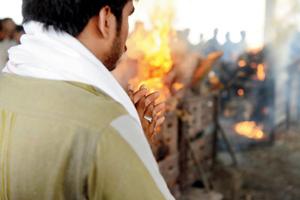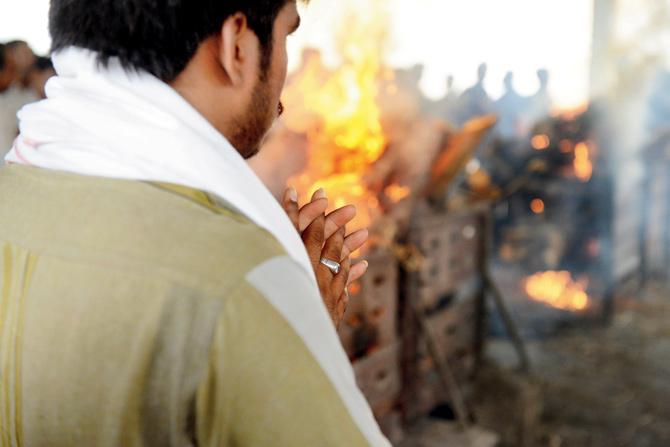The crematorium manager wanted a fat tip even while my mother's ashes were warm in the urn. Here's what happened next


Representation Pic/AFP
My mother died at 84, on September 1, 2015. I was two oceans away, settling my son into his new university life in Montréal. Back in Mumbai, my two sisters and brother did what had to be done. Relatives were notified, last rites performed, and the body taken to the electric crematorium where we'd interred my father decades ago.
Cremation is a sombre moment. The tears have almost dried up, the words have been said. After years of watching a slow decline, death is not a surprise. So they stood there, my siblings, in the crematorium manager's office, to receive the warm earthen pot with the ashes of the woman who had made us everything we were.
Waiting with them was a fellow, a crematorium worker, blase about yet another death but eager for the customary tip. He made some money-seeking sounds, and my sister, distracted, pressed a Rs 1,000 note into his hand. We normally get Rs 2,000, he murmured. She gave him a second note. He still hung around, and then leaned forward to whisper. Apparently, a senior officer of the crematorium would drop by to see how things were going. It was normal, she was told, to give him Rs 3,000.
My sister, never at a loss for fire, asked him what he had done to merit that sum. It was the tradition, she was told. Haggling over a tip seemed the wrong action for the moment, so she gave him the money. But when she reached home, she Internetted out the email address of BMC's erstwhile municipal commissioner, explaining in plain, unfettered English that he was paying a salary to a staff of flesh-eating vultures who feasted off the grief of Mumbai's bereaved.
To her astonishment, within hours, she had received an invitation to meet with the man himself, three days away. A strange thing happened the following morning. The crematorium's manager and his money-grubbing workers, who had sought and received 'tips', showed up at our house. The envelope they handed over contained all the money they had extorted.
"Please take your tips back, madam," they beseeched my sister. "Just kindly cancel that appointment you have with the municipal commissioner." "Ah, no, I didn't make that appointment, so I cannot be the one who cancels it," said my sister. When she went to the Andheri office that issues death certificates, her name triggered an immediate flutter of interest. Apparently her letter to the commissioner was all the news that day. Many employees congratulated her for standing up to the crematorium's predators. At the BMC three days later, there were more surprises. The manager and key staff of that particular crematorium had been invited and were sitting in the outer room with hangdog looks. The commissioner wasted no time with them.
"You are accused of soliciting and extorting exorbitant tips from grief-stricken family members in the moment of their greatest grief — in return for doing a job that you are already paid to do," he said. "Please sign here, and here and here." He pushed letters of confession towards each of them, and they signed without a murmur. "These letters will be photocopied and mailed to every crematorium worker in Maharashtra, as an object lesson," he said.
They looked at their shoes wretchedly. "That's not all," he continued. "You are all hereby suspended from your jobs for a period of four months. This too will be made known to all your colleagues." He paused. "You may go now," he said, ending the meeting. Mumbai has surprised me in the past with its compassion. I remember during the biblical floods of 2005, when 1,094 people died and thousands were stranded in their cars, householders came out with coffee, tea and hot breakfast for those stranded souls as dawn broke.
But there is a dark underbelly to Mumbai, and it is predatory, ruthless, and astute. In 1996, I wrote in mid-day about a schoolboy, Murtuza, hit by a lamppost too close as he hung out of a train approaching Chembur. The wheels ran over both his legs. He was rushed to Sion Hospital, where he died despite all efforts.
But when his parents came to collect the body from the morgue, they found a leg missing. None of the ward boys seemed to know where it was. Eventually, it was whispered that the leg might be miraculously 'found' if a certain amount was paid to a ward boy. And so it was. That was 1996. Living in distant Bangkok, where too I'm certain corruption smiles, but in more sophisticated ways, I hear often that in the new India of the Modi raj, there is less tolerance for everyday corruption. Moments like this make me believe they may be right.
Here, viewed from there. C Y Gopinath, in Bangkok, throws unique light and shadows on Mumbai, the city that raised him. You can reach him at cygopi@gmail.com Send your feedback to mailbag@mid-day.com
Catch up on all the latest Mumbai news, crime news, current affairs, and also a complete guide on Mumbai from food to things to do and events across the city here. Also download the new mid-day Android and iOS apps to get latest updates
 Subscribe today by clicking the link and stay updated with the latest news!" Click here!
Subscribe today by clicking the link and stay updated with the latest news!" Click here!







